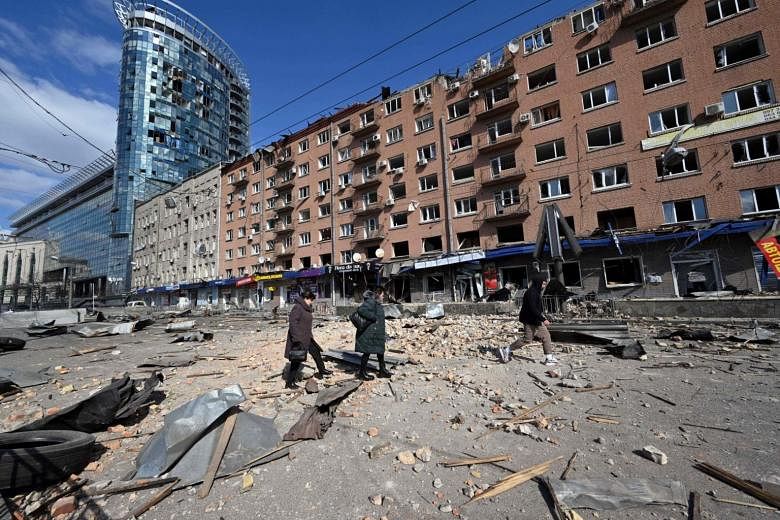SINGAPORE - A vast majority of Singaporeans back Ukraine in its ongoing war with Russia, while six in 10 agree with the Republic's decision to slap sanctions on Moscow, according to an online survey conducted over March 9 to 10.
The Blackbox Research poll found that 95 per cent of 1,711 Singaporeans interviewed supported or sympathised most closely with Ukraine in the conflict which Russia started on Feb 24, calling it a special operation to disarm its neighbour.
Kyiv and its Western allies, however, say Russian President Vladimir Putin launched the invasion as an act of aggression aiming to subjugate Ukraine.
Singapore, like many countries around the world, reacted by imposing sanctions on Russia earlier this month targeting banks and goods like electronics, computers and military items. This move was supported by 60 per cent of Singaporeans polled by Blackbox, with 35 per cent saying they were unsure or had no opinion.
A total of 6,920 people aged above 18 responded to the survey conducted across Australia, China, India and Singapore. Data was weighted by age and gender to better reflect the latest census data in each country, said Blackbox, a Singapore-based agency that monitors emerging regional and global trends.
Four per cent of the Singaporean respondents said they were behind Russia in the conflict, which the United Nations said has killed hundreds of Ukrainian civilians and led to more than three million fleeing to neighbouring countries.
In China - where respondents are mostly from urban cities Beijing, Shanghai, Chongqing, Guangzhou and Shenzhen - 3 per cent felt the same, with 71 per cent saying they sympathised with Ukraine instead.
More than eight in 10 in China were undecided on their government's stance, which Blackbox framed as not taking sides in the conflict.
Beijing has not condemned Russia's actions, saying it recognises Ukraine's sovereignty but that Moscow has legitimate security concerns.
In both Australia and India, where urban dwellers also make up most of the respondents, around 9 in 10 polled said they supported Kyiv.
Apart from sanctions, Singapore has denounced Russia's actions as an unprovoked attack that violates international law and sets a "dangerous precedent" for small states like itself.
Some quarters in the Republic have questioned this strong posture, against a backdrop of swirling propaganda and disinformation pushing pro-Russian, pro-China and anti-United States views online.
Authorities have told The Straits Times that they are keeping a close watch for possible hostile information campaigns directed at Singapore in relation to the ongoing conflict.
In the Blackbox poll, nearly seven in 10 Singaporean respondents said they blamed Russia for the crisis, while just over half of those in China said they did not know. Three per cent in China said the US was at fault.
Respondents were also asked to state their agreement with a set of statements. Over six in 10 in Singapore did not think that the invasion would herald the beginning of World War III; half were not sure if Russia would emerge victorious; while more than four in 10 did not think Ukraine would win.
The majority of respondents in China answered "not sure" to all of these statements, including one on whether Beijing would eventually be pulled into the conflict.
Quizzed on their impressions of Russia, Ukraine and their presidents, 1 per cent of Singaporeans said they viewed Mr Putin positively, compared to 80 per cent for his Ukrainian counterpart Volodymyr Zelensky.
Close to 70 per cent had a positive image of Ukraine, with the proportion for Russia coming in at 5 per cent.
Australian and Indian respondents shared similar sentiments as the Singaporeans.
The Chinese were particularly ambivalent on Russia - with 46 per cent neutral and 45 per cent viewing Moscow negatively; while nearly seven in 10 were neutral on Ukraine.
On how Mr Putin and Mr Zelensky came across to them, the same majority proportion of Chinese - 74 per cent - said they were neutral.


